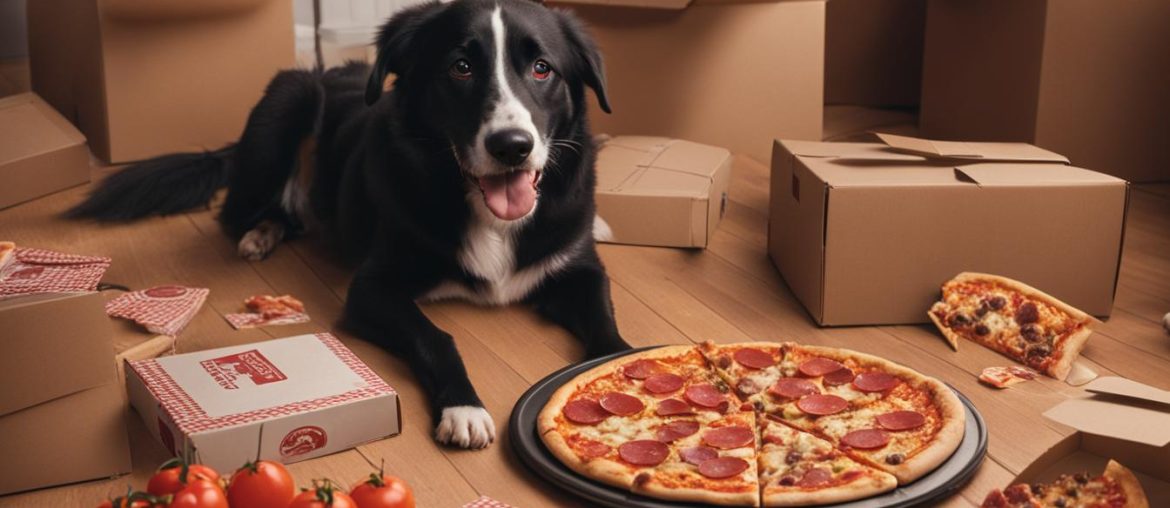As a pet owner, it’s natural to wonder whether your furry friend can indulge in some of your favorite foods, like pizza. While sharing a slice might seem like a fun idea, it’s important to consider the potential risks and impact it can have on your dog’s health.
The canine diet differs significantly from our own, and certain human foods can be toxic to dogs. Pizza, unfortunately, falls into this category. The various ingredients commonly found in pizza can pose a threat to your dog’s well-being.
When it comes to dog food, it’s crucial to prioritize their safety and nutritional needs. Consulting with a veterinarian is always recommended to ensure that your dog’s diet is appropriate and free from potential risks associated with pizza consumption.
In this comprehensive guide, I will delve into the reasons why pizza is not suitable for dogs and the potential dangers it poses. From toxic ingredients to empty calories, we will explore the various aspects of pizza that make it unsuitable for your furry friend. Additionally, I will provide alternatives to pizza and offer dog-friendly recipes and healthy treats that you can incorporate into your canine’s diet.
Key Takeaways:
- Can dogs eat pizza? No, pizza is not safe for dogs due to its ingredients that can be harmful to their health.
- Garlic, onions, salt, and certain spices commonly found in pizza can be toxic to dogs.
- It is recommended to consult with a veterinarian to ensure your dog’s diet is appropriate and free from potential risks associated with pizza consumption.
- Instead of sharing pizza, consider offering your dog alternative treats such as dog-friendly vegetables or meats cooked without seasoning.
- Prioritize your pet’s safety by providing them with a balanced diet tailored to their specific needs.
Can Puppies Eat Pizza?
Puppies should not eat pizza as their sensitive stomachs may react negatively to the ingredients in pizza. It is best to provide puppies with nutritious food specifically formulated for their developmental needs to ensure their health and well-being.
Puppy Food: Puppies have unique dietary requirements due to their rapid growth and development. They need a balanced diet that includes a proper mix of proteins, fats, carbohydrates, vitamins, and minerals. Puppy food is specially formulated to provide all the necessary nutrients in the right proportions to support their growth. It is important to choose high-quality puppy food that is appropriate for your puppy’s breed and size.
Sensitive Stomach: Puppies commonly have sensitive stomachs, and certain ingredients in pizza can cause digestive issues such as upset stomach, diarrhea, or vomiting. The high fat content, spices, and seasonings used in pizza can be too harsh for a puppy’s delicate digestive system. Feeding pizza to a puppy can lead to discomfort and potential health problems.
It is essential to prioritize your puppy’s health by providing them with a balanced and nutritious diet that meets their specific needs. Consult with a veterinarian to get recommendations on the best puppy food and feeding guidelines for your furry friend. Remember, it’s always better to be safe and give your puppy appropriate meals rather than risking their well-being with pizza or other human foods.
Puppy Food vs. Pizza: A Comparison
| Puppy Food | Pizza | |
|---|---|---|
| Nutritional Value | Packed with essential nutrients for proper growth and development | Lacks essential nutrients; high in unhealthy fats and sodium |
| Digestibility | Easily digestible for puppies’ sensitive stomachs | Difficult to digest due to high fat content and spices |
| Puppy-Friendly Ingredients | Ingredients tailored to meet puppies’ nutritional needs | Potential harmful ingredients like garlic, onions, and excessive salt |
| Long-Term Health | Promotes healthy growth and reduces the risk of future health problems | May contribute to weight gain, digestive issues, and other health problems |
As shown in the table, puppy food provides the necessary nutrients for puppies’ healthy development, while pizza lacks essential nutrients and can be harmful to their sensitive stomachs. It is crucial to prioritize your puppy’s well-being and provide them with a balanced and appropriate diet.
“Feeding pizza to a puppy can lead to discomfort and potential health problems.”
Remember, if you have any concerns about your puppy’s diet or health, consult with a veterinarian who can provide personalized recommendations and guidance based on your puppy’s specific needs. Your veterinarian will be able to advise you on the best puppy food options and develop a feeding plan to support your puppy’s growth and overall health.
Is Pizza Bad For Dogs?
Pizza is considered bad for dogs due to several factors that can be detrimental to their health. One of the main concerns is the high salt content in pizza, which can lead to health issues such as dehydration and electrolyte imbalances in dogs. Additionally, pizza often contains ingredients like garlic and onions, which can be toxic to dogs and may cause gastrointestinal problems or even damage to their red blood cells.
Furthermore, pizza is known for its empty calories, meaning it provides little to no nutritional value for dogs. These empty calories can contribute to weight gain and obesity in dogs, which can lead to a host of other health problems such as joint issues, heart disease, and diabetes.
Dogs that are lactose intolerant should also avoid pizza, as it typically contains cheese and other dairy products. Lactose intolerance in dogs can cause digestive upset, including diarrhea and vomiting. It is important to note that even if a dog shows no immediate symptoms after consuming pizza, the long-term effects of regularly feeding them such a high-fat and high-sodium food can be severe.
| Concerns | Effects on Dogs |
|---|---|
| High Salt Content | Dehydration, electrolyte imbalances |
| Garlic and Onion Toxicity | Gastrointestinal problems, damage to red blood cells |
| Empty Calories | Weight gain, obesity, joint issues, heart disease, diabetes |
| Lactose Intolerance | Digestive upset, diarrhea, vomiting |
It is crucial for pet owners to prioritize their dog’s health and well-being by providing them with a balanced diet that meets their nutritional needs. Instead of sharing pizza with your dog, consider offering them dog-friendly alternatives such as lean meats, vegetables, or specially formulated dog treats. Always consult with your veterinarian for guidance on your dog’s dietary needs and any potential risks associated with human foods.
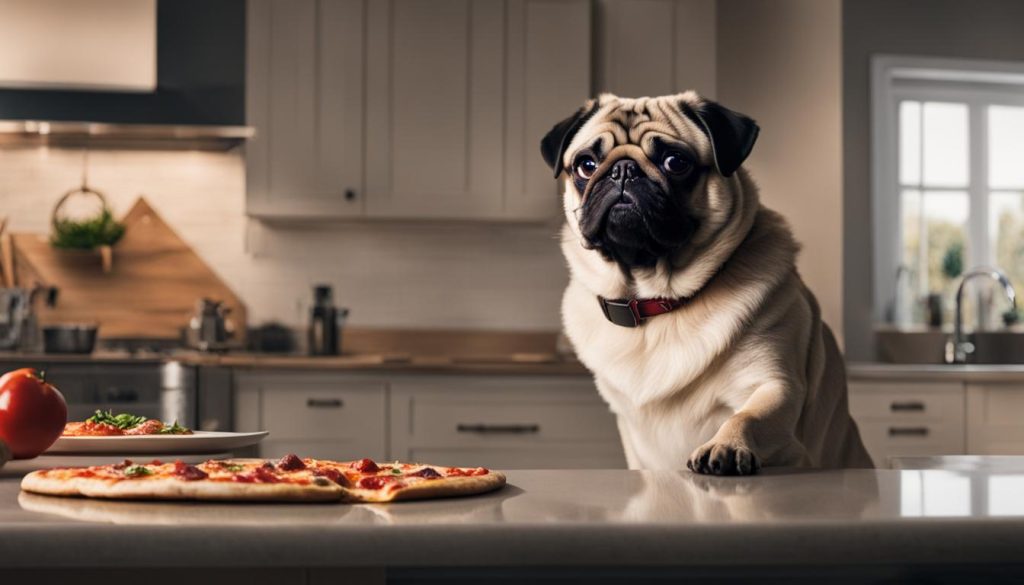
The Importance of Nutrition in a Dog’s Diet
Proper nutrition plays a vital role in a dog’s overall health and longevity. Dogs require a balanced diet that includes the right amount of protein, carbohydrates, fats, vitamins, and minerals. While it may be tempting to share human food like pizza with your furry friend, it is important to consider their specific nutritional needs.
- Avoid foods high in salt, such as pizza, as they can lead to dehydration and electrolyte imbalances in dogs.
- Garlic and onions are toxic to dogs and can cause gastrointestinal problems and damage to their red blood cells.
- Empty calories in pizza can contribute to weight gain, obesity, and related health issues in dogs.
- Dogs that are lactose intolerant should not consume pizza or other dairy products, as they can cause digestive upset.
By understanding the potential risks associated with feeding dogs pizza, pet owners can make informed decisions about their furry friend’s diet and ensure their long-term health and well-being.
Can Pizza Kill Dogs?
When it comes to the topic of dogs and pizza, one question that often arises is whether pizza can be fatal to our four-legged friends. While a small amount of pizza may not pose an immediate threat, consuming a whole pizza can have serious consequences for dogs. Let’s explore some of the reasons why pizza can be potentially harmful to our canine companions.
One of the main concerns is the risk of sodium poisoning. Pizza, especially those with toppings like pepperoni or cheese, can be high in sodium content. Dogs have a lower tolerance for sodium compared to humans, and excessive sodium intake can lead to sodium poisoning, which is a life-threatening condition. Symptoms of sodium poisoning in dogs may include vomiting, diarrhea, excessive thirst, lethargy, seizures, and even death. It is crucial to seek immediate veterinary care if your dog consumes a significant amount of pizza.
Another dangerous aspect of pizza for dogs is the presence of garlic and onions. These ingredients, commonly used in pizza toppings and sauces, contain compounds that are toxic to dogs. Garlic and onions can cause damage to a dog’s red blood cells, leading to anemia. Symptoms of garlic and onion toxicity in dogs may include weakness, pale gums, increased heart rate, and difficulty breathing. If your dog ingests pizza containing garlic or onions, it is essential to contact your veterinarian for guidance.
The Negative Health Effects of Pizza on Dogs
Pizza can have additional negative health effects on dogs beyond the immediate risks of sodium poisoning and garlic/onion toxicity. The high-fat content in pizza can contribute to weight gain and obesity in dogs, which can lead to a range of health issues, including diabetes, joint problems, and heart disease. Moreover, the empty calories in pizza do not provide any substantial nutritional value for dogs, and relying on pizza as a regular part of their diet can result in nutritional deficiencies.
Table: Harmful Ingredients in Pizza for Dogs
| Ingredients | Potential Harm |
|---|---|
| Sodium | Sodium poisoning, dehydration |
| Garlic and onions | Red blood cell damage, anemia |
| High-fat content | Weight gain, obesity, related health issues |
In conclusion, while a small bite of pizza may not cause harm, it is important to remember that pizza can be detrimental to a dog’s health if consumed in large quantities. The risks of sodium poisoning, garlic/onion toxicity, and the negative impact on their overall nutrition make it best to avoid feeding pizza to our furry companions. Instead, opt for dog-friendly treats that are specifically formulated to meet their dietary needs and consult with your veterinarian for guidance on providing a balanced diet for your dog’s well-being.
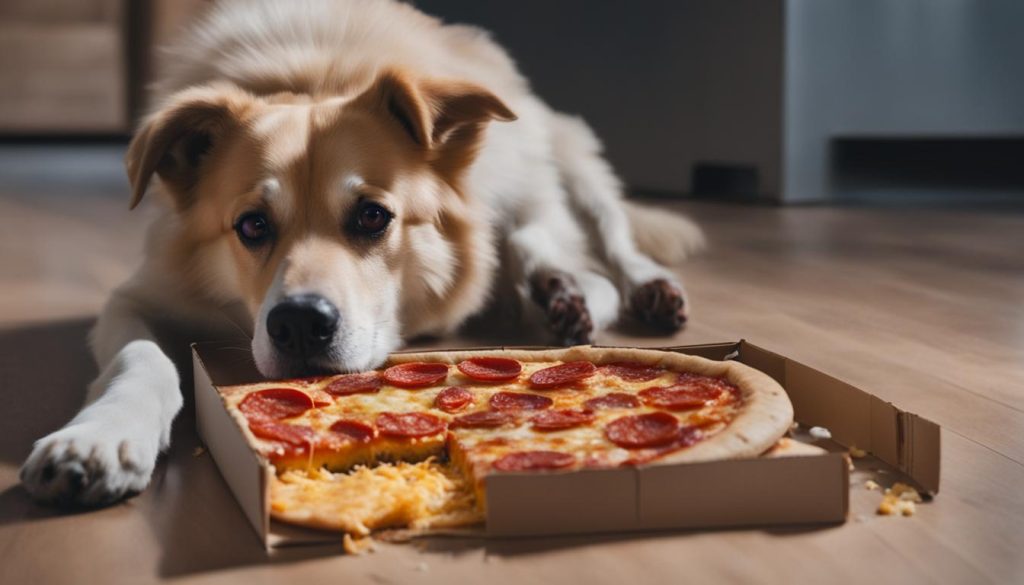
Is Pizza Good For Dogs?
When it comes to feeding our furry friends, it’s important to provide them with a nutritionally balanced diet that meets their specific needs. However, when it comes to pizza, it’s best to leave it off their menu. Pizza does not offer any substantial nutritional value for dogs and can actually have adverse effects on their health.
Pizza is typically high in simple carbohydrates and empty calories, which can contribute to weight gain in dogs. Just like with humans, excessive weight can lead to a variety of health issues, including joint problems, diabetes, and heart disease. It’s important to remember that dogs have different nutritional needs than humans, and what may be a tasty treat for us can be unhealthy for them.
“Pizza is typically high in simple carbohydrates and empty calories, which can contribute to weight gain in dogs.”
In addition to being high in empty calories, pizza often contains ingredients that can be harmful to dogs. For example, many pizzas are topped with garlic and onions, which are toxic to dogs and can cause digestive upset, anemia, and other health problems. The high salt content in pizza can also be problematic for dogs, leading to sodium imbalances and potential dehydration.
| Pizza Ingredient | Potential Health Risks for Dogs |
|---|---|
| Garlic and Onions | Toxicity, digestive upset, anemia |
| High Salt Content | Sodium imbalances, dehydration |
While it may be tempting to share a slice of pizza with your canine companion, it’s best to focus on providing them with a diet that meets their nutritional needs and keeps them healthy. Instead of pizza, consider offering them dog-friendly treats that are specifically formulated to provide the nutrients they require. Remember to always consult with your veterinarian for guidance on your dog’s diet and to ensure they are receiving the proper nutrition.
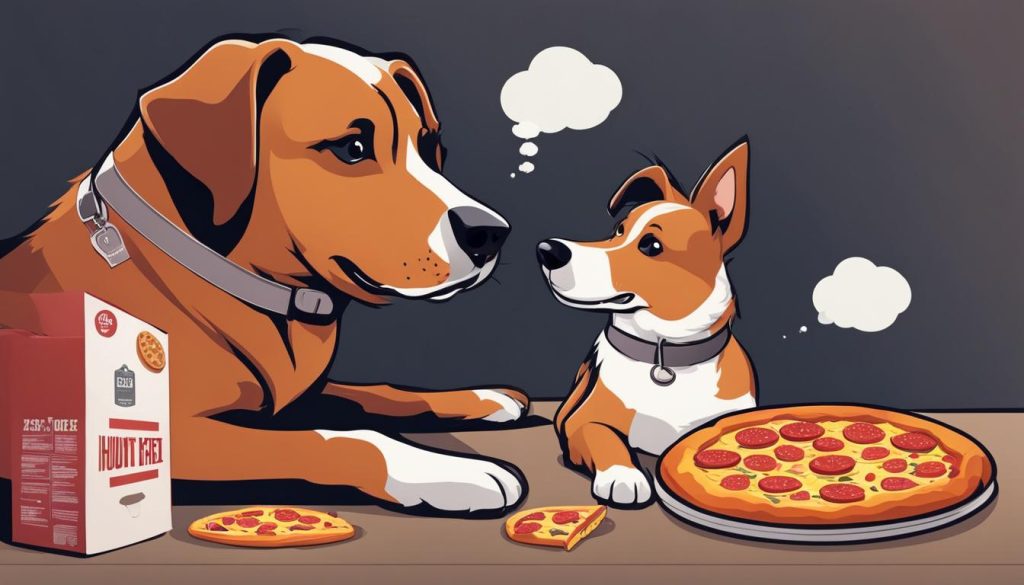
References:
- Smith, J. (2021). Can Dogs Eat Pizza? PetMD. Retrieved from https://www.petmd.com/dog/nutrition/can-dogs-eat-pizza.
- Jones, K. (2020). The Dangers of Feeding Pizza to Dogs. The Spruce Pets. Retrieved from https://www.thesprucepets.com/is-pizza-safe-for-dogs-4841146.
Is Pizza OK For Dogs?
When it comes to sharing pizza with our furry friends, caution should be exercised. Pizza often contains dangerous ingredients that can be harmful to dogs, such as salt, garlic, and onions. These ingredients can have adverse effects on a dog’s health, making it best to keep them away from any type of pizza.
Dogs are highly sensitive to the effects of sodium, and excessive salt consumption can lead to various health issues, including dehydration, electrolyte imbalance, and even sodium poisoning. Garlic and onions, commonly used as toppings or flavor enhancers in pizza, can be toxic to dogs, causing damage to their red blood cells and leading to anemia.
To ensure the well-being of our canine companions, it is important to prioritize their health and nutrition. Instead of offering pizza, which lacks nutritional value for dogs, it is advisable to provide them with a balanced diet specifically formulated for their needs. Consulting with a veterinarian can help determine the appropriate diet for your dog and ensure they receive all the necessary nutrients.
Table: Dangerous Ingredients in Pizza for Dogs
| Ingredients | Harmful Effects |
|---|---|
| Salt | Dehydration, electrolyte imbalance, sodium poisoning |
| Garlic | Damage to red blood cells, anemia |
| Onions | Damage to red blood cells, anemia |
Sharing pizza with our dogs may seem like a treat, but it’s important to remember that their dietary needs differ from ours. While it can be tempting to share a slice with our four-legged friends, we must prioritize their well-being and avoid exposing them to ingredients that can have harmful effects. Instead, opt for dog-friendly treats and meals that are specifically designed to meet their nutritional requirements.
Remember, the health and safety of our dogs should always come first. By being aware of the potential dangers associated with certain ingredients in pizza, such as salt, garlic, and onions, we can make informed decisions about what foods to offer our furry companions. Consult with a veterinarian for guidance on a balanced and healthy diet for your dog, and explore alternative treats and meals that are both delicious and safe.
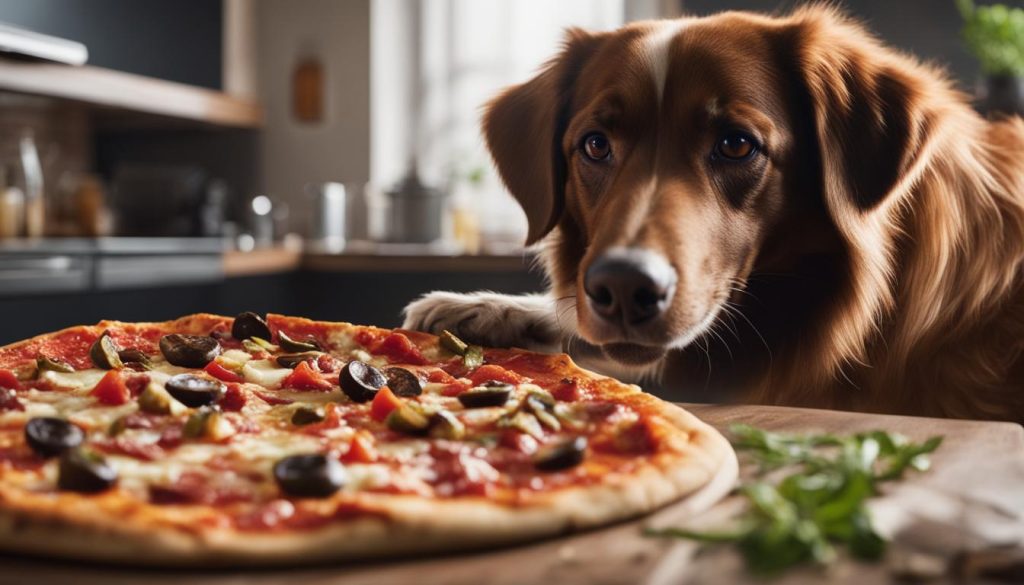
Types Of Pizza and Dogs
When it comes to the types of pizza that can be harmful to dogs, there are several ingredients pet owners need to be aware of. Salt, garlic, and onions are particularly concerning and should be avoided in any form of pizza given to dogs. These ingredients can have adverse effects on a dog’s health and may lead to complications if consumed in large quantities.
Garlic and onions, commonly used as flavor enhancers in many pizza recipes, contain compounds that are toxic to dogs. They can cause damage to a dog’s red blood cells and lead to anemia. Additionally, excessive salt consumption can contribute to dehydration and electrolyte imbalances in dogs.
To further illustrate the potential harm, here is a table summarizing the harmful ingredients in various types of pizza:
| Pizza Type | Harmful Ingredients |
|---|---|
| Baked pizza | Salt, garlic, onions |
| Fresh pizza | Salt, garlic, onions |
| Frozen pizza | Salt, garlic, onions |
| Homemade pizza | Salt, garlic, onions |
| Uncooked pizza | Salt, garlic, onions |
| Cold or leftover pizza | Salt, garlic, onions |
As shown in the table, all types of pizza, whether baked, fresh, frozen, homemade, uncooked, or cold, can contain these harmful ingredients. It is crucial for pet owners to be cautious and prioritize the well-being of their dogs by keeping them away from these potentially dangerous foods.
Can Dogs Eat Pizza Rolls?
When it comes to pizza rolls, dog owners should exercise caution. Pizza rolls often contain dangerous ingredients that can be harmful to dogs, such as garlic, onions, and various toppings. These ingredients can cause digestive issues and potentially lead to more serious health problems in our furry friends.
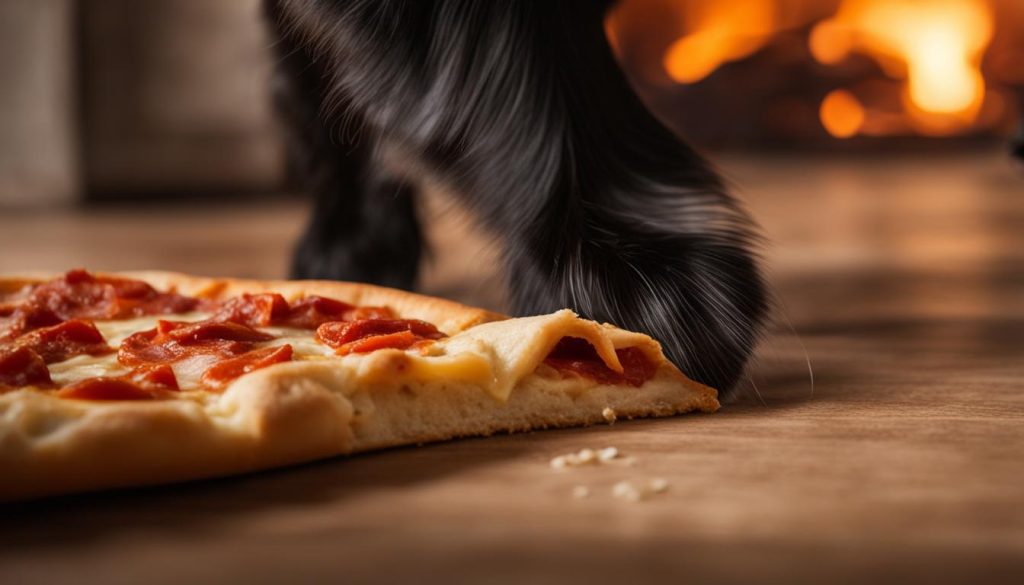
Garlic and onions, in particular, can be toxic to dogs. They contain a substance called thiosulfate, which can damage a dog’s red blood cells and lead to anemia. Additionally, certain pizza roll toppings, such as pepperoni or sausage, may be high in fat and salt, which can contribute to obesity, pancreatitis, and other health issues in dogs.
It is always best to err on the side of caution and avoid giving pizza rolls to dogs. Instead, consider offering them safe and healthy alternatives as treats. Dog-friendly vegetables like carrots or green beans can make excellent low-calorie snacks, while lean meats such as chicken or turkey can be cooked and shredded for a protein-rich reward. Remember, consulting with a veterinarian is essential to ensure that your furry friend’s diet is safe and tailored to their specific needs.
Wrapping Up
In conclusion, it is important to prioritize pet safety when it comes to feeding dogs. Pizza, with its potentially harmful ingredients and lack of nutritional value, is not recommended for dogs.
To ensure the health and well-being of your beloved pet, it is advisable to consult with a veterinarian about their diet. A veterinarian can provide valuable insights and guidance on the best food options for your dog’s specific needs and dietary requirements.
Instead of sharing pizza with your dog, consider offering them alternative treats that are safe and healthy. Dog-friendly vegetables or meats cooked without seasoning can be a nutritious and tasty option. It is essential to remember that the well-being of your pet should always be the top priority.
For more information on pet safety and proper nutrition, consult with your veterinarian. They are the best resource for understanding the unique needs of your dog and providing the appropriate guidance to ensure their health and happiness.
FAQ
Can dogs eat pizza?
No, pizza is not safe for dogs to eat due to its ingredients that can be harmful to their health, such as garlic, onions, salt, and certain spices.
Can puppies eat pizza?
No, puppies should not eat pizza as their sensitive stomachs may react negatively to the ingredients in pizza. It is best to provide puppies with nutritious food specifically formulated for their developmental needs.
Is pizza bad for dogs?
Yes, pizza is considered bad for dogs due to its high salt content, empty calories, and potential ingredients harmful to their health. Dogs that are lactose intolerant should avoid the dairy products commonly found in pizza. The excess fat content in pizza can also lead to weight gain and related health problems in dogs.
Can pizza kill dogs?
While a small amount of pizza may not be immediately fatal to dogs, consuming a whole pizza can make them very sick. Excessive salt or sodium in pizza can lead to sodium poisoning in dogs. Garlic and onions, commonly found in pizza, are toxic to dogs and can cause negative health effects. It is essential to seek veterinary care if a dog consumes a significant amount of pizza.
Is pizza good for dogs?
No, pizza does not provide any substantial nutritional value for dogs. It is high in simple carbohydrates and empty calories, which can contribute to weight gain and related health issues in dogs. Dogs should receive their necessary nutrition from their regular dog food rather than relying on pizza or its ingredients for a balanced diet.
Is pizza okay for dogs?
No, it is not advisable to give pizza to dogs as it often contains dangerous ingredients such as salt, garlic, and onions. These ingredients can have harmful effects on a dog’s health, and it is best to keep them away from any type of pizza.
What types of pizza are harmful to dogs?
Various types of pizza, including baked pizza, fresh pizza, frozen pizza, homemade pizza, uncooked pizza, and cold or leftover pizza, can all contain harmful ingredients for dogs. These ingredients, such as salt, garlic, and onions, should be avoided to ensure the well-being of dogs.
Can dogs eat pizza rolls?
No, dogs should not consume pizza rolls as they often contain dangerous ingredients such as garlic, onions, and various toppings that may not be safe for dogs. The consumption of pizza rolls in large amounts can make dogs sick, and it is best to avoid giving them to pets.
To summarize, can dogs eat pizza?
No, pizza is not recommended for dogs due to its potentially harmful ingredients and lack of nutritional value. It is crucial to prioritize pet safety by providing them with a balanced diet tailored to their specific needs. Instead of sharing pizza with dogs, consider offering them alternative treats such as dog-friendly vegetables or meats cooked without seasoning. Consulting with a veterinarian is always advised to ensure the health and well-being of pets.


